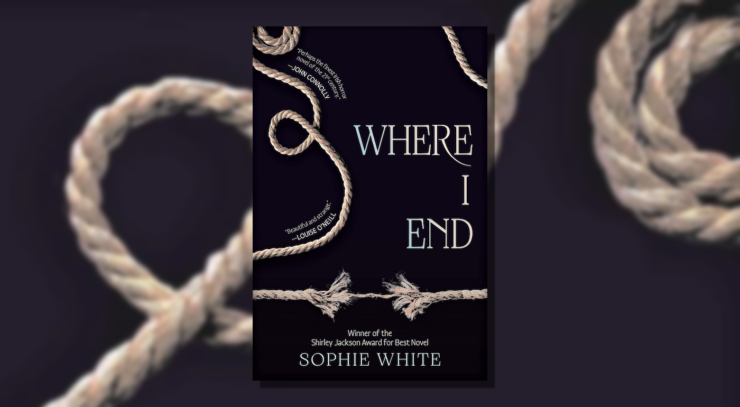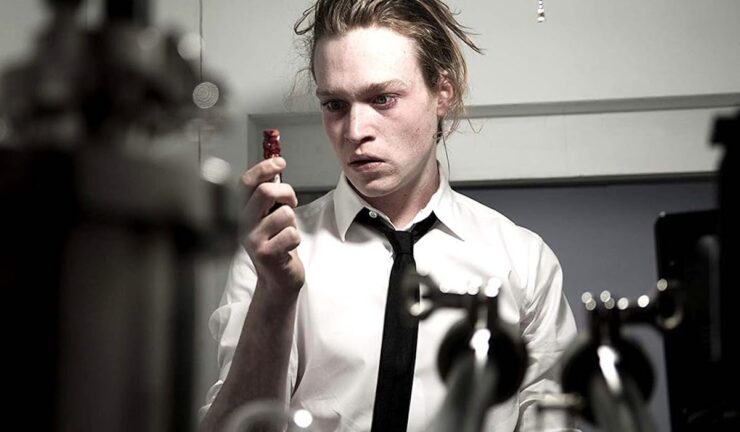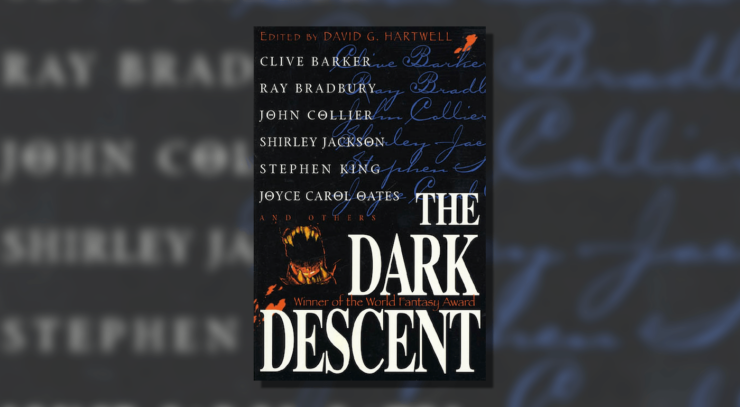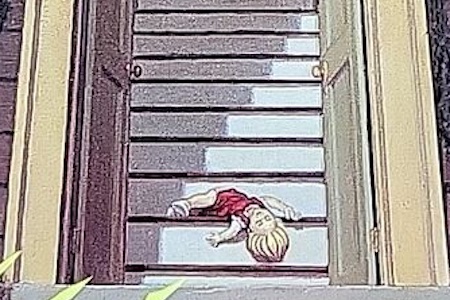We’re thrilled to share an excerpt from Where I End by Sophie White, a gothic horror novel publishing with Erewhon Books on September 24th.
Aoileann is cursed. She has no friends, never gone to school. She has never left this windswept craggy isle off the coast of Ireland. Her mother is cursed: a silent wreck Aoileann calls the “bed-thing.” Alongside her grandmother, Aoileann’s days are an endless monotony of feeding, changing, and caring for the bed-thing.
Their island seems cursed, whispering secrets only Aoileann hears. Then Rachel, a vivacious artist from the mainland, arrives with her colicky newborn. Rachel arouses yearnings Aoileann cannot fully comprehend. Soon, the unfolding of her mother’s secret tragedy and Aoileann’s pursuit of her own dark desires are both destined to unleash a maelstrom upon all three of their lives.
My mother.
At night, my mother creaks. The house creaks along with her. Through our thin shared wall, I can hear the makings of my mother gurgle through her body, just like the water in the walls of the house. I hate the sound. In the daytime, it is covered, wrapped up in the radio and the wind and the low hum of the electricity. But at night, in the silence, her insides gush and she seems alive in a way that, during daylight, she does not. The gush forces thoughts of her effluent, her needs; of the things my grandmother takes care of but that I will have to do someday soon. I don’t want to, which makes me feel bad. I hate her body—it’s an awful thing.
Sometimes in the morning we find her in places. We never see her move. We just come upon her. Maybe she is coiled on the rug in the hall. That rug leads to the old front door—the front door that is never used. Its handle was gone from before I can remember. Without the handle, it is just a smooth rectangle of wood. The door doesn’t need to be boarded up. When you reach for a handle and your hand swipes through nothing, it’s as effective as any deadbolt. Just as final. My mother, heaped before the front door that is not a door, looks like a thwarted escapee.
My home.
The island is a treasure, the brochures say. Untouched. A wild place. Unspoiled. But when you live here, which hardly anybody does, it doesn’t seem wild; it seems the very opposite. It seems resigned. The island slices up from the ocean, thrusting skyward like the prow of a sunken ship. At the high end, the island runs out at sheer cliffs. At the low end of the island is a broad sandy beach. The sand is grey, like iron filings. The wind pushes patterns across the surface and, if you sit for a while, it will stain you grey and your hair and mouth will fill with shards of the beach. I’ve been to beaches on the Mórthír and they’re not like our beach. On those beaches the sand is settled, bright and clean. It doesn’t invade. It lies docile, succumbing to the sea.
I can never decide which part of the island I hate most. The cliffs are devious, they could draw you over. The beach feels less perilous, but there’s a murky feeling in my stomach when I stand and look out from there. I think I can see the hidden part of the island, the part that is submerged. Under the water’s surface, it runs away from me, granite slabs falling back into the black. I don’t like that what I can see of the island is only a sliver of its full awful self. I don’t like that the rest of the island is lurking beneath us. On the beach, I feel like I have to keep watch. I must stay vigilant. I must keep the submerged part of the island in sight. I’m looking for danger. Just like when I was little and would slip down the hall at night to the bathroom, my back pressed to the wall so that there could be nothing unseen behind me.
Buy the Book
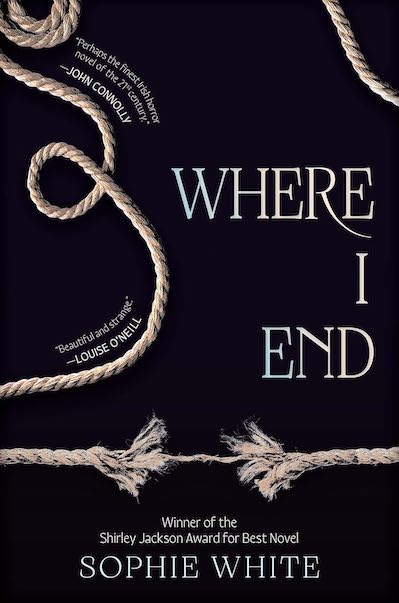

Where I End
On the steel beach, if I’m facing the water, the rest of the island rears up behind me, poised like a dense wave. ‘Behind you, behind you!’ like they shrieked at the play Dada brought me to in the theatre on the Mórthír when I was little. Balding velvet seats and plastic cups of ice cream with sweet green and red gel. We went to the matinee so that he could put me back on the boat straight after. The island man on deck reluctantly said he’d mind me and make sure I got home. He spat at my feet all the way to keep me from getting too close. I got home.
The fishermen use the old dock, the Seancéibh, on the island’s south side, but the ferry lands at the new dock just down from the beach. The new dock was built in the seven- ties when they still thought they could save the Old Knitting Factory. The factory wallows about a mile up from this by the side of the only real road on the island. The factory is the sole two-storey structure on the island built with the same trickle of government funding that had brought electricity to the island in the fifties. The outsiders were oddly fixated on ‘preserving’ the island’s ways—the realities they clearly didn’t know the half of. The Knitting Factory was foisted on the community to, as they said, ‘create employment and protect the island’s crafting traditions and way of life’. Gobshites, my grandmother belched out roughly whenever the subject came up. The project, like the building, sagged—its stucco walls are stamped with mingy windows topped with a roof half-gnawed by the elements, giving it a defeated expression. The new dock was supposed to make transport of the famous blankets and geansaís easier. Still, the factory died anyway. Producing the island exports was too arduous to justify. No one could pay island hands enough to keep them from turning to other things. Fishing is the main work now. And passing the hours till these boats come in and the heads are counted.
If I stand on the steel-sand beach for a while, eventually an easterly wind will probably rush me back up our sawtooth island towards the high ledge where the land ends. In between is two miles of stone walls, punched into the island rock like rivets. The walls run in every direction, but there’s no pattern or logic to them. They’re built from shards of the limestone that breaks off the island, wedged upright like teeth. The walls have no cement but never topple despite the steep angle of our island or the unrelenting wind and sheet rain that bombards us.
Among the walls are houses dotted and, in one spot at the island’s halfway mark, several small buildings have clumped at the end of the island road: the pub, the shop that doubles as the post office, the church—a simple structure. Inside, the small room is scattered with fold-up chairs. The tentative priest comes from the mainland once a month to do little more than rearrange his collapsed chairs. The islanders are tolerant of him, but both sides know his visits are for box-ticking alone. The bishop dispatches him to sell their stories, but the islanders know the sea is God. They know that religion is a pathetic performance, a plea for clemency by lost people. The sea laughs at such pleading. The Seancéibh is just a little way down from here. Wherever you are on the island, the water is always close.
From the little rash of dwellings, the island starts to thrust up more steeply. The vertical rock sides of the north and south edges drip water at low tide as though, instead of the ocean only receding, the island’s underside is rising. The long, pale grasses that reach up between the island’s cracks grow in the direction of the back of the island, as though combed through. They remind me of her hair. The back edge of the island is so high above the rest that the edge cannot be seen until you climb all the way up there. No one does though. The islanders prefer to look the other way, eastward toward the Mórthír. They prefer to pretend that the edge doesn’t exist, in case a fixation takes hold of them and they are drawn up there—it’s happened before. The last house before the edge is our house.
My house.
I don’t understand my house. It’s never been explained to me. From the outside it is backwards. Circle it and you’ll see. It once faced the rest of the island. At some point, the front door and front windows looked down at the walls and the far beach, at the Seancéibh and our neighbours. Faint traces of old decoration can be found. The relic of a hanging basket sways up to the right of where the door was. A barrel to the left held plants. Now the hollow of the flaking door frame and the squares of the windows are stacked with the same blades of serrated limestone that make up the island walls. They are pressed and slotted in so tightly that the work of forcing each fragment into place must’ve been gruelling. Who did it? Did their hands bloody and bruise at the task? The gaze of the house is now unnerving. It has been gagged, the eyes and mouth stuffed shut with the stacked splintered rock. The straight- edged lines are steely stitches that have sewn our house closed. Inside is worse.
1.
The decision to end this thing comes on slowly, like light filling a room after a fathomless night. It began like this:
In my bed, the first sound of the morning tears the silence and finds me. It’s the hinges of her bed, they pierce the bare rooms of the house with a quiet but sustained whine. High pitched, insistent, it’s the opening of another blank day. Even from the next room, the creaking breaches my body. It slices through my chest and down my upper arms, disturbing me and bringing me back from the pleasant nothing of sleep. The creak scrapes and cries and I am returned to myself, fully (unfortunately) alive again.
After the freedom of sleep, I am once more confined to my life. The hideous animal squealing is the hoisting of her bed. On the other side of the wall, the ropes falter, agonising inch by inch along the timber beam just under the ceiling in her room next door. The hinges bawl.
When my grandmother pauses in her work to regrip the rope, the creak quiets and I can hear her panting. Pulling the thing in the bed up into position and winding her back down at night bookends our every day.
I know I must help my grandmother but walking to the next room every morning feels like a descent. I slide into my hole, a hole I will spend the day trying to emerge from. Still, it has to be done. The consequences of neglect are as bad for us as they are for her. Neglect only piles more jobs on.
‘Tamallín,’ I call to my grandmother. ‘I’m coming.’ Feet on floor and I’m up. I hurry to the hall, frigid in the morning, and then into its room. Móraí, as I call my grandmother, is standing hunched at the head of the bed, straining to hold the rope down against the pull of gravity. I join her there and grip high on the rope. With two hands, I pull down hard so that she can then hook the loop, tied at the end many years ago, around a hook driven into the floor—presumably around the same time. I’ve always been very careful of the rope ever since the day when I was eight and I loosened my grip just the teensiest bit. The tough old rope shot through my hands, the head of the bed slammed down and her head banged directly onto the hard timber. At the time we used to take the pillows off while hoisting as they sometimes became wedged in the angle of the bed as it rose. We don’t anymore. That time, a rivulet of blood had run from under her head and over the edge of the bed frame. Móraí had cursed and stepped around the blood to twist the bed-thing’s head and check the wound. It wasn’t until I had reached for the rope to get back into position that I noticed my own blood wetting my hands. My palms were shredded. I don’t remember any pain, just a shock at seeing it. I was used to her blood by then but had never seen my own. For a few weeks after that, I had bandages on my hands and was cautious with the hoisting. We scrubbed her blood away from the floor though my blood is still on one small stretch of the rope, aged brown and slight. It would only be noticeable to us.
For me, the rope, the loop and the hook have been there my whole life, but I suppose they haven’t been there forever. I suppose Móraí and Dada, one day, took stock of where things were going with the bed-thing and had decided permanent fixtures were needed for a permanent problem.
With the rope secured in position, I must now look at her. I busy myself adjusting the pillows on the top half of the bed, the half we have just raised. I can see the top of her head. Her scabby hair, her teeth and her toenails are all the same uncolour: leached of pigment. From this angle, I cannot see the worst of her face—only a jut of cheek bone and the stretched cheek falling away below. Her mouth always hangs a bit open unless we tie it closed, which we often do to make her more tolerable. I smooth the edge of the pillow, careful to skirt the strands of hair that have strayed across it. I’ll look at her in a minute, I resolve. It takes effort, some days more than others.
Móraí is already at the foot of the bed rearranging the blankets and nodding up at her daughter-in-law in her worn-in ritual of morning greeting.‘Lá brea atá ann inniú.’ Móraí does the weather first as if today is the day the thing might be coaxed from the bed with this news that the morning is good outside. ‘Agus bhí oíche cúin agat aréir.’
Móraí tells her that she’s had a quiet night every day regardless of what has gone on. The nights are not always uneventful but they are quiet; we never hear the bed-thing move.
I inch back out of the bedroom towards the hall.
‘I’ll do the kettle,’ I say as Móraí lifts the legs and checks the nappy. In the daytime, we bring her to the toilet, but at night, lesson learned long ago before I remember, we use a nappy. I hate it. Changing her was always Móraí’s job, but now that I am older, nearly twenty, it is becoming obscene to just stand and watch my grandmother grapple with the heavy dead limbs.
Now most days, I bend the bed-thing’s knees up and watch Móraí crouch and fiddle below. Móraí has crouched between the legs of half the women on the island. Before I was born, she was the midwife and the first to handle each new baby to join the island. I know I was the last slippy baby she caught and set loose with a clamp and scissors, but I don’t know why I was the last. She says she wasn’t needed anymore but there’s been mishaps since then. A baby was born out in a skiff halfway to the Mórthír and was nearly dead from the cold when they got there. Other women took up the job on the island after that, but more accidents followed like a run of cursed luck, meaning now mothers leave for the mainland far in advance of their due dates and stay there until the baby comes.
‘Why won’t they call you?’ I persist each time a young woman whose baby has ripened leaves, hitching a ride with the fishermen.
‘They don’t need me anymore,’ she repeats. They don’t want me anymore, is what I know she really means. They don’t want any of us.
(They’ve never wanted me)
I didn’t know it for a long time, but it is a bizarre thing to only ever be ignored or stared at. When I go about the island, the children stare with wide eyes and black gorm- less mouths. The adults do the opposite; they don’t look at all. They glimpse me coming, sometimes just in the corner of their eyes and they turn away with great force. Once it was raining hard down by the Seancéibh and I was under the hood of the green wax jacket Dada keeps on the island. I could see Reeney Roche coming towards me. It was rare that islanders would come as close, and I was able to see the bread and tins she was carrying through the plastic carrier bag hanging by her side. Getting up so close meant I could examine her in detail.
The islanders all share a similar look, the result of genetic material passed back and forth for so many generations—it has distilled into a distinct, unpleasant appearance. Móraí and Dada have it too somewhat. Me less so as my mother is from the outside.
The island people are all cowed and crumbling, as though parts of the island have become dislodged and are moving about the place. Their heads are lumpen. At the front, eyes, nose and mouth are clustered together, huddled in the centre of the face. The chin and jaw reaches forward, jutting like the rocky outcrops that stretch into the water at the lower end of the island. Their chalky grey surface suggests no rush of life within. If I chipped at one, I imagine the organs would hang inside the hollow, fossilised. Even the children of the island are calcified. Their cries and laughter die in their throats.
Reeney Roche’s eyes were fixed on the ground in front of her, so it wasn’t till we each reached either end of a large puddle and our eyes met in the water that she realised who was standing six feet in front of her. She reeled back, spitting. Her eyes bulged and snapped away from me so fast that I wondered if she felt a queasy pull at the back of her eyeballs.
I tried on the smile Móraí had me practice from time to time but it was pointless. Reeney had already turned around and was streaking back the way she’d come. I stomped back up the shale road that eventually leads to our house. I didn’t mind that Reeney had fled. I was in a black mood because my lips were stinging where my sudden smile had split the papery skin.
When I was younger, I didn’t realise that there was any other way people might respond to the sight of me. Then I went to the mainland for the first time. I was going to see the special doctor and we had to walk to his office from the port. I was feeling sick and my guts stirred every time I thought of what was going to happen. I was eight and I thought from the snippets I’d heard between Móraí and Dada that this doctor was going to look inside my head and would be able to read my mind. I churned with the idea. Would he know what I’d done with the cats? Would he sense how much I’d liked it? The weight of their bodies leaving my hands. The helpless creatures flung up into the sky. Would he know how I felt about what was in the bed? I resolved to try and empty my mind. I imagined cleaving my head open, hunching forward and tipping the whole awful soup out and into the street before he could reach in and feel blindly, combing out strings of grim things tangled in his fingers like viscera.
In the end, the doctor learned nothing on that trip.
I barely spoke to him.
But I learned something.
I learned that not everyone stares and not everyone flees. Out on the streets after the appointment was over, I felt calmer and began to notice what was around me. The town was ordered. On the island, there’s one road of tarmac for the handful of cars. This road runs up the middle of the low half of the island. The rest of the roads spider out from this smooth black artery. All the other roads are unpaved and unruly, they rise up and fall off in duet with the contours of the island. They’ve been worn in by feet over many years. Some lead to cottages and livestock, fields and allotments. Some lead straight off the sides of the island. The roads have a streak of grass down the centre and smashed shaly rock on either side. The oldest ones are gouged so deep in the land that you can’t see over the high sides. It’s easy to get confused and be spat out at the end to an unexpected drop.
The path up to our house is the last one on the island and our house is the last outpost before the land ends. Our little road is barely distinguishable from the wind- blown fields on either side—no one but us walks it, so no track is worn. The route remains scabbed over with scrub and stubborn boulders parked here and there. Because the ground is starting to tilt upwards here, the fields are scoured with wind and no one puts their animals up here. We don’t have any animals to look after, except of course for the obvious one. Though it’s funny: we do sometimes find her out in the fields, sprawled in the damp of grey mornings.
In the town on the mainland, the roads ran parallel and perpendicular with a compelling uniformity. The buildings looked too precise to have been made by humans. The way the people moved was different too. They were assured and focused.
To move from place to place, the islanders don’t take steps as such, instead a foot, curled and tensed, will slide forward from under them and then the second will follow. Their feet cling to the earth as though relinquishing their grip on the land is dangerous. On the mainland, the people’s eyes glanced off me with indifference. Sweet, incredible, hitherto unimaginable indifference. It made my return harder. It made my exclusion harder to deny. The contrast meant that over time, my long-held hurt began to be replaced with something altogether more uncomfortable. The Something frightened me. I didn’t learn the word for it for a long time.
Excerpted from Where I End, copyright © 2024 by Sophie White.










